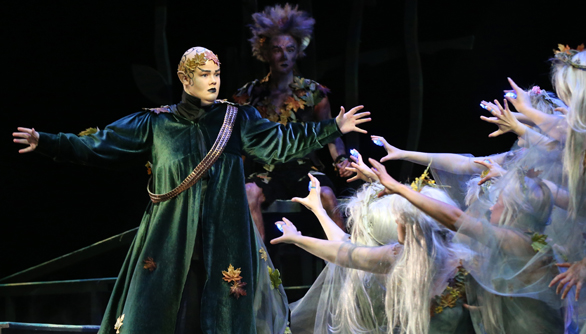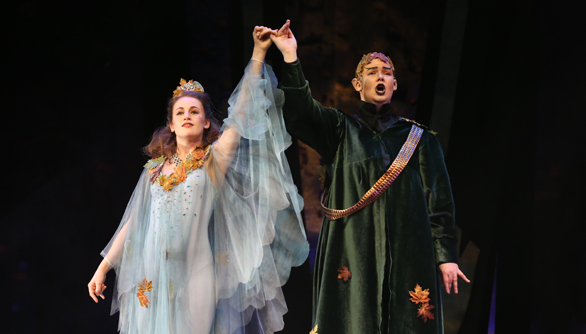Observing Oberon: A Contralto’s View of Oberon’s King
Postgraduate Rebecca Starling is singing the role of Oberon in the RNCM production of Britten’s A Midsummer Night’s Dream on 19, 23 and 27 March, made possible thanks to the kind permission of the Britten-Pears Foundation. Here, she shares her thoughts on why the role is rarely performed by contraltos, and how her voice type is the perfect fit for Midsummer’s famous King.
The phenomenon that is the contralto voice is a fairly modern one. It is generally held that the term contralto had not been widely heard before Mendelssohn; that is not to say they didn’t exist, but simply that they had previously been categorised as mezzo-soprano. The countertenor on the other hand is a long established voice type and has been recognised in music for hundreds of years.
Vocally the two have a strong relationship and, as is seen in many operas and oratorios, often share roles meaning that – depending on the demand or fashion of the time – they were in rivalry. A Midsummer Night’s Dream is distinct in that, despite the score presenting the role for both countertenor and contralto, it is rarely performed by the latter.
The Britten-Pears Foundation recognises the voice of a contralto in playing the role of Oberon and now encourages artists to explore the possibility of it being played more regularly by such singers. In the 1960s and 70s it seems there was an understanding that, if a countertenor could be found with a sufficient breadth of voice (the role is considered to sit quite low in a modern countertenor’s tessitura) then they are preferable.

Of course the role has been performed by women across the globe, but rarely in a high profile, professional production – despite there being many contraltos who sing it very well. It appears that audiences were not thrilled by Alfred Deller’s first performance and a few houses chose to adapt the role for tenor, mezzo-soprano and bass.
In Reinventing the Dream: A Midsummer Night’s Dream on Stage, David Nice writes: ‘If mezzos ever sang Oberon again after Josephine Veasey in the 1967 Covent Garden revival, I have no record of the fact.’
Perhaps the emergence of James Bowman in 1967 to the role of Oberon is what scuppered the hopes of contraltos being cast as this character. His performance was highly praised and his recording is often cited as ‘the definitive representation of Oberon’.
A daunting challenge indeed and one that I myself grasped with tentative hands. However, I was not alone and unearthed an interesting parallel with myself and another ‘low lady’, Pamela Bowden, who studied at the Royal Manchester College of Music in the 1940s. Although it didn’t make it to stage she did prepare the role of Oberon later in life and received permission to play it.
Personally, in preparing for the role, what I lacked, perhaps, is that ‘ethereal and alien sound quality’ that Britten sought when casting a countertenor. However, the contralto voice is still fairly rare and it is a sound that many audiences do not hear as often as I think they should, which I argue is its own ‘ethereal and alien sound quality’. If the purpose of having a countertenor was to break boundaries and engulf the audience in a new sound world then certainly the contralto voice also has the potential to do this.
Evidence to suggest that it would be fitting for one such as myself to sing the role can be found in the music. Britten’s writing lends itself easily to the contralto voice as it sits perfectly with the contralto range and does not push the voice at either end to do anything that sounds unnatural.
Britten had to deal with Deller’s ‘comfortable range’ when writing the role of Oberon, which was less broad than he would have liked. Britten always promised that one day he would re-write the role for a modern countertenor voice, which can stretch much higher than that of Deller’s bottom heavy range. Of course this was not to be born, for which I am a little bit grateful; it gives me the opportunity to step into some fairly big shoes and, hopefully, show that future contraltos could wear them just as effectively and dramatically as Alfred Deller, James Bowman and David Daniels.
Do I hope to play this part again professionally? Most definitely. Will I? Well that is for me to convince the public that I can.
The RNCM production of Britten’s A Midsummer Night’s Dream opens on 19 March 2015 and runs until 29 March.
18 March 2015


